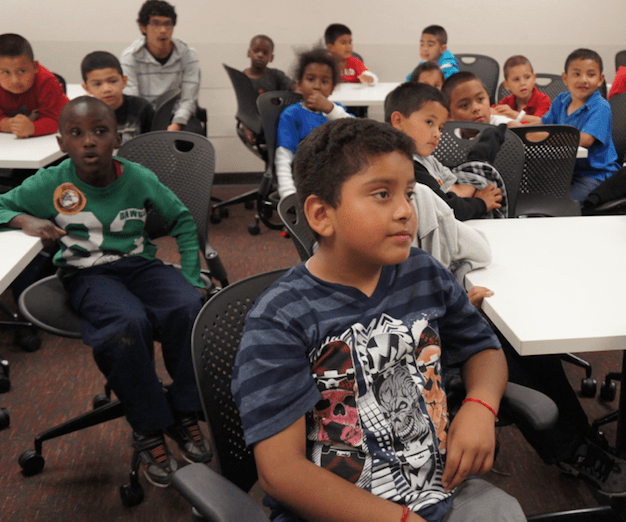It was less than a year ago when first-grader Sebastian Vega-Chacon was having behavioral issues that nearly led to his suspension at school.
Sebastian’s teacher noticed his below-average score in reading comprehension and referred him to Kinder2College, a USC literacy program that helps Latino and African-American boys become proficient in reading and writing by the end of the third grade.
For more than a year now, Sebastian and his mother have attended the Kinder 2 College sessions on Saturday mornings on the USC campus.
“Sebastian was having a hard time learning how to read and write, and he would get teased a lot at school,” said Yolanda Vega-Chacon.
“At first, he wouldn’t leave my side,” she said about Sebastian’s first days in the program.
“By the third Saturday, he was gradually becoming more independent, talking more with the other participants, teachers, mentors and enjoying the play-learning activities,” she added. “The personalized attention and mentor relationship has helped him significantly.”
Sean Taitt MSW ’11, Kinder2College program manager, said the initiative combines empirical research with early childhood practices.
“It is known that most schools have [an] age requirement to enter kindergarten,” Taitt noted. “What most schools do not acknowledge is that children learn different developmental tasks at various times.”
According to a 2011 report published by the Annie E. Casey Foundation, a student who can’t read on grade level by the third grade is four times less likely to graduate by age 19 than a child who can read proficiently by that time. In addition, failure to read proficiently is linked to higher rates of school dropouts.
“The kindergarten through third grade years are critical,” said Kim Thomas-Barrios, executive director of Educational Partnerships at USC. “With the Kinder 2 College program, our intention is to get as many boys at least at [reading] grade level if not above grade level.”
The Kinder2College curriculum includes physical activity that most children interpret as play, the benefits of which have been well documented for children’s literacy development, according to researchers.
For example, there is a game of catch in which participants form a circle, pass a soccer ball to peers and ask them to spell a word. If the recipient knows the word, he spells it. If recipients don’t know the spelling, they say, “Please give me another word.”
“We want to create a stimulating curriculum in which the children are able to play and engage in various activities,” Taitt said. “This summer we will be utilizing a Readers Theater curriculum in hopes to have them perform mini-plays for their families.”
Mentorship plays a role in Kinder2College, which pairs high school students from the USC Neighborhood Academic Initiative with Kinder2College enrollees. The program will expand this summer thanks to a $20,000 gift from USC supporters Dan Harari and Barbara Keller. The donation will enable the number of participants to increase from 63 to 100.
“Literacy is an important part of a child’s educational foundation and critical to each child’s future,” Harari said.
One of the key elements of the Kinder2College program is its focus on both the individual student and his parents, who may face difficulties while helping their children with schoolwork because of language and educational barriers. With that in mind, one of the program’s goals is to inform parents about what expect in their child’s academic future.
A recent evaluation conducted through the USC Families of Schools revealed that children in the literacy program have seen an improvement in their reading and writing skills
“We’re very happy with the results,” Thomas-Barrios said.
“Sebastian’s self-esteem and confidence has increased dramatically,” Vega-Chacon said. “The sportsmanship and the mentorship he gets on Saturdays has transformed my son. Now he does his homework without me asking and behaves, for the most part, because he knows that if he does well, he gets to go to USC.”
